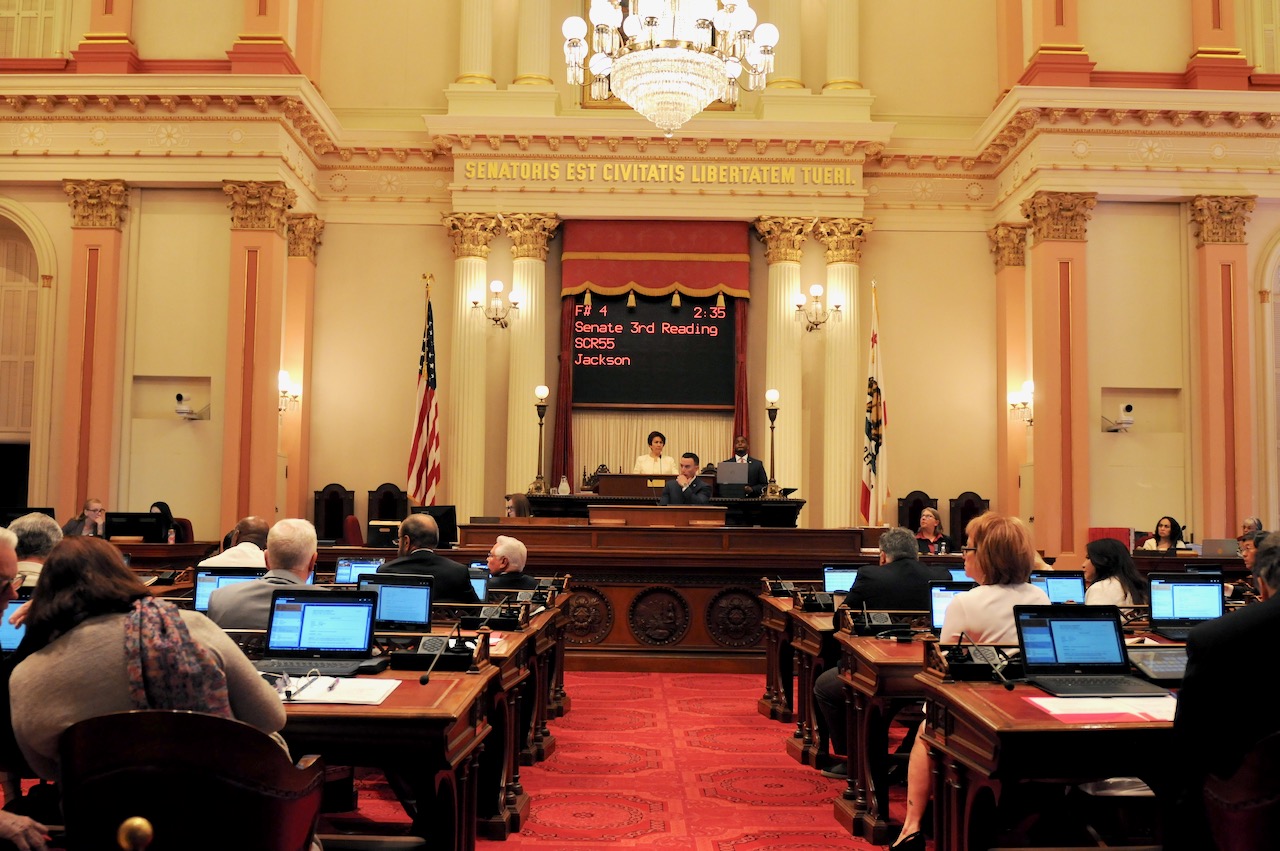
Assemblywoman Buffy Wicks. (Photo: Kevin Sanders for California Globe)
‘Journalism Usage Fee’ Legislation Proposed In CA Assembly
If passed, companies such as Google and Facebook would pay fee to media companies for using content
By Evan Symon, March 22, 2023 12:41 pm
A bill that would have big tech companies pay a fee to news outlets for using or posting articles and other local news content was introduced in the Assembly this week.
Assembly Bill 886, authored by Assemblywoman Buffy Wicks (D-Oakland), would specifically have digital advertising companies, such as Google or Facebook, pay for content they use from media outlets. The bill, also known as the California Journalism Preservation Act (CJPA), would pay a “journalism usage fee” to outlet owners each time local news articles are used by the companies that also sell advertising along with it. Publishers would receive the funds would then need to invest at least 70% back into funding journalism jobs, such as going toward paying journalists or creating new journalism positions.
Assemblywoman Wicks wrote the bill over the significant decline of local newspaper outlets in California in the past decade, largely attributed to a huge loss of print advertising, with only small gains made in online advertising. Classified ads alone in newspapers went from generating over $19 billion a year for newspapers in 2000 to $2.3 billion in 2019. Since 2020, newspaper advertising revenues have sunk a total of 66% more, with media outlet employees going down 44%. While online advertising has been going up more in recent years, it is projected to not make up for the loss of print advertising for the foreseeable future.
According to Wicks, the fee would help make up for lost revenue and would compensate media companies for content they generated but did not receive advertising revenue for because it was on a different platform such as Google or Facebook.
“The CJPA provides a lifeline for news outlets – large, small, and ethnic – by directing a portion of the ad dollars back to the print, digital, and broadcast media that bear the entire cost of gathering and reporting local news while Big Tech bears none,” Wicks said in a statement on Monday. “These dominant digital ad companies are enriching their own platforms with local news content without adequately compensating the originators. It’s time they start paying market value for the journalism they are aggregating at no cost from local media.”
“There is more at stake with AB 886 than who pays and gets paid – more important is preserving local news providers. As news consumption has moved online, community news outlets have been downsizing and closing at alarming rates. By driving more digital ad revenue to local outlets and requiring investments in journalism jobs, AB 886 will produce a more stable news ecosystem, especially in smaller and ethnic communities.”
“Studies have shown that communities without local journalism suffer consequences ranging from declining civic engagement and lower voter turnout to higher taxes and increased public corruption. In that sense, legislators from virtually every corner of the state have a vested interest in ensuring that quality local journalism is preserved. AB 886 is an important step in that direction.”
Wicks added on Tuesday that “California has lost more than 100 newspapers in the last decade. Our constitutional founders understood the importance of a free press. And when you have an ecosystem where there’s not a level playing field and newspapers are shutting down left and right, that concerns me from a democracy standpoint.”
Support for, against AB 886
Media organizations such as the California News Publishers Association (CNPA) and the News/Media Alliance (NMA) quickly backed AB 886. Many see it as a way to finally get around the long-standing issue of how to monetize digital content effectively and to make up for the wide print ad-digital ad gap that has plagued outlets for over two decades. In addition, more online-based outlets stand to benefit as well, as they would be included under the new fee system.
“Big Tech has become the de facto gatekeeper of journalism and is using its dominance to set rules for how news content is displayed, prioritized, and monetized,” noted CNPA Chairwoman Emily Charrier. “Our members are the sources of that journalism, and they deserve to be paid fair market value for news they originate.”
However, many other outlets and media organizations remain concerned that different companies could unfairly favor different outlets by where they are placed or promoted, and that some outlets could be positioned to be seen first, and ultimately be given more of the fees, over others. Tech companies that would need to pay these proposed fees have also come out against the bill as well.
“AB 886 could lead to outlet favoritism if passed,” explained online advertising consultant Darren Adams to the Globe on Wednesday. “Companies like Google are especially in a place of power to promote certain outlets over others, and thus have these fees go there instead of others. It’s not exactly a fair system. Other outlets they could ding as unreliable or something like that, and just cut them off that way. There’s a lot of ways this can deprive those fees fairly to other outlets.”
“But that’s even if they get that far. Canada, Australia, and other countries have tried to put in a fee like this in and they have fought tooth and nail to prevent it, so California would just be another battleground. Another country is one thing, but having one state switch over could bring a huge domino effect nationwide. It’s always California, isn’t it?”
“Yeah, overall the state needs to come out ahead of Google and Facebook, both based within the state by the way. Even if this passes, which is a longshot, they can tie this up in the courts for years. And even if it somehow survives there, these companies can just sort of pick and choose who they would want the fees to go to essentially. Many think that a fee is the right way to bring back revenue to newspapers, but a lot needs to be sorted out beforehand.”
AB 886 is expected to be brought to Assembly committees soon.
- Man Who Broke Into L.A. Mayor’s Home to Receive Probation, Mandatory Drug Treatment - July 25, 2024
- California National Guard Counterdrug Task Force Seizes nearly $4 Million Worth Of Fentanyl In June Following Ramping Up Of Actions - July 24, 2024
- San Francisco’s Guaranteed Income Programs for Trans People to End - July 24, 2024





Because usual-suspect CA newspapers (think L.A. Times, Sac Bee) once wanted and probably still want to be funded by the government (gee, great idea! NOT), and in the meantime, as I recall, outlets such as the L.A. Times were exposed as being on the receiving end of CCP cash, the worst of CA newspapers would likely go for this bill big time, for all the wrong reasons. Also it appears to be a sneaky method of censoring certain unwanted truths by certain newspapers who publish pesky truths (think California Globe). So nice try, Buffy, but this one sure as heck appears to be a resounding NO. AB 866.
Kinda funny that pretty much all we need at this point is to see that same photo of Asm Buffy Wicks, with her dead shark eyes and bad reputation, to know that trouble isn’t far behind.
Own nothing and be happy – World Economic Forum 2030 goal
Oh look, it’s creepy Democrat Assemblywoman Buffy Wicks with her soulless dead eyes from the dystopian City of Oakland who supports infanticide. Now she’s pushing bill AB 886 that would have big tech companies pay a fee to news outlets for using or posting articles and other local news content? Who could be possibly giving her payoffs to author this legislation? Hmmm, maybe it’s media organizations such as the California News Publishers Association (CNPA) and the News/Media Alliance (NMA) that quickly backed AB 886? Or as Showandtell mentioned, maybe it’s also leftist Democrat propaganda outlets like the LA Times, San Francisco Chronicle, Sacramento Bee, etc.??
🙂 TJ
Exactly
On its face it seems rational, therefore there is a built in advantage to democrats that we have to found yet. Google and Facebook are not going to accept it. They are industries built on theft of data, and ownership of the levers of voting.
Good luck.
Could simply speed up AI’s taking jobs from journo’s as why pay NYT when you can have your bot-writer provide stories?
Great point.